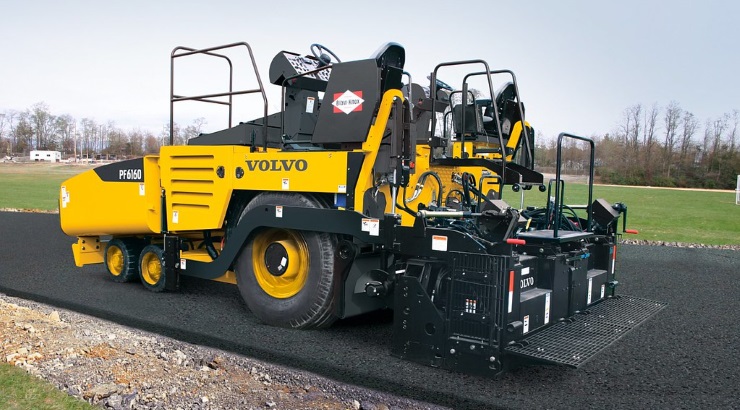Features
Popular Types of Road Construction Material
A quick overview of the most popular road making materials.

Road construction is a highly technical venture that requires a range of distinct materials to ensure the motorways are durable and well able to support heavy loads and traffic.
Road materials range from natural soils, aggregates, binders such as lime, asphalt, concrete, and assorted products used as admixtures for improved quality of roads.
Road material list
Here’s a list of the popular types of road construction materials:
1. Soil
Soil naturally tops the list of materials used in road construction. It is the eventual point which supports the complete structure of the road.
Indeed, soil is the primary road material for the foundation, subgrade, or the pavement in the case of low traffic rural roads. It provides the essential flat base that offers the vital support for the road structure.
A process known as compaction, where soil particles are pressed together to reduce pore space between them, is usually carried out on site to give the soil at the base some higher resistance and greater stability.
Being a natural material, soils have different qualities that need to be studied carefully before building a road. Soils with more clay and silt particles, for example, are prone to erosion and contraction if they come into contact with water.
Such soils require special treatment to avoid poor workmanship.
2. Aggregate
Stone aggregate, also known as mineral aggregate, is easily the most important component of materials for road construction. It is made by breaking up naturally occurring rocks to form coarse aggregate (like gravel) or fine aggregate (like sand).
Aggregates are used for granular bases, sub-bases, as part of bituminous mixes and cement concrete. They are also used as the primary material for relatively cheaper road, known as water-bound macadam.
Like soil, aggregates must be tested by a road engineer to ascertain that they are strong enough and durable for a specific project. These properties are influenced by their origin, mineral components and the nature of bond between the components.
3. Asphalt and Bitumen
Asphalt and bitumen are often mistaken as being one and the same thing. However, while asphalt is a mixture of aggregates, binder and filler, used for constructing roads and their associated furniture, bitumen is actually the semi-solid binder that holds asphalt together.
Bitumen, which is also known as mineral tar, is obtained through unfinished distillation of crude petroleum. It contains 87% carbon, 11% hydrogen and 2% oxygen.
On the other hand, asphalt is manufactured in a factory that heats, dries and mixes aggregate, bitumen and sand into a composite mix. The material is then applied on site using a paving machine at a nominated or required thickness, depending on the type of project.
RELATED: The 7 Most Powerful Road Construction Equipment
When used for road construction, asphalt comes in the form of a composite material known as asphalt concrete. This road making material is 70% asphalt and 30% aggregate. Asphalt is 100% recyclable, which makes it one of the most popular materials for making roads.
4. Concrete
Concrete offers a lot of flexibility and ease of construction – making it an important road material. It is created by mixing cement, coarse aggregate, fine aggregate, water, and chemical admixtures (which make up 25-40% of concrete).
In addition to reducing costs, concrete is popular among road builders due to its ability to extend the service life of a road.
It can also be used to raise the bearing capacity of existing pavement layers.
A well-made concrete mixture sets and hardens because of the binding property of cement. It forms a mix with slimmest void space.
On curing with water, it provides a strong, steady and long-lasting pavement for a road – resisting repetitive impact from heavy commercial vehicles.
Composite Pavement
This is a type of pavement that uses both asphalt and concrete to form a ‘super’ pavement.
Composite pavements can potentially become a cheaper alternative to traditional pavements thanks to their ability to provide higher levels of performance and durability, both structurally and functionally.
The downside of concrete is that it is susceptible to problems such as reflective cracking and rutting in the surface layer. However, these potential hitches can be resolved by applying a premium asphalt surface or through some other (costly) mitigation techniques.
Eco Friendly Road Material
Road builders are increasingly under pressure to lower their carbon footprint. This is important considering that cement, a key input material in road construction, contributes one tonne of carbon for every tonne of cement produced.
Reduction of carbon emission can be achieved by use of alternative road construction materials such as crushed concrete – a recycled material – which can generate enormous savings in energy and production costs.
Sustainability can also be reached through the use of eco friendly concrete, which cuts the usage of Portland cement in road construction.
Besides, the use of recycled materials components, which are produced from industrial wastes, can lower greenhouse gas emissions while cutting costs.
Other sustainable materials include reclaimed asphalt pavements, recycled concrete aggregate, and coal combustion products obtained from coal-fired power plants.
FAQ:
What are the materials used for road construction?
Asphalt and concrete are the most common types of road materials.
Asphalt is manufactured in a factory that heats, dries and mixes aggregate, bitumen and sand into a composite mix. Concrete is created by mixing cement, coarse aggregate, fine aggregate, water, and chemical admixtures.
What material is best for road construction?
Asphalt is easily the best and most popular material used in road construction.
Asphalt-based road construction method offers numerous benefits including low noise during pavement, and relatively low construction costs.
What are the types of road construction?
The four major types of road construction methods. These include earth road, and gravel road, bituminous road, concrete road, and water-bound macadam road.
Read full article here.












